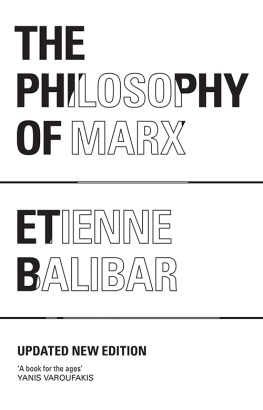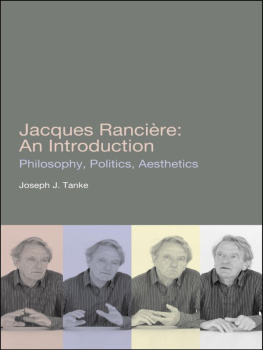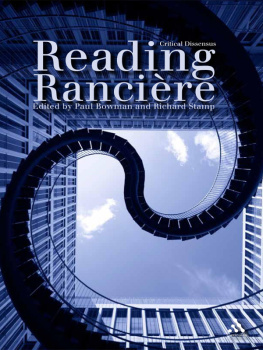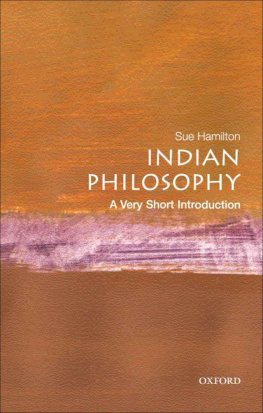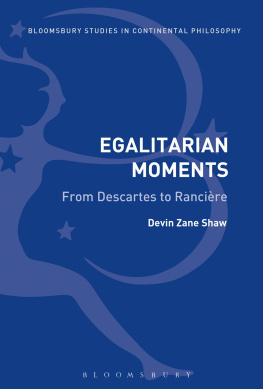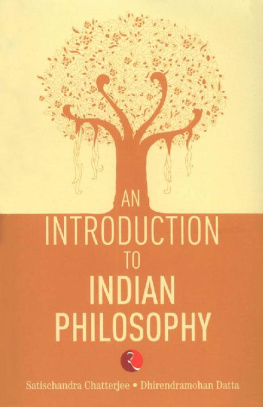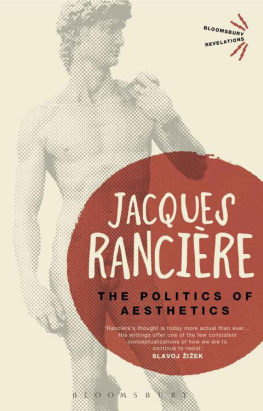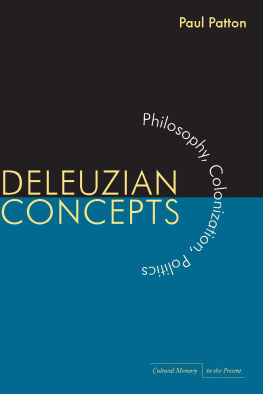Jacques Rancire
Key Concepts
Key Concepts
Published
Theodor Adorno: Key Concepts
Edited by Deborah Cook
Alain Badiou: Key Concepts
Edited by A. J. Bartlett and Justin Clemens
Pierre Bourdieu: Key Concepts
Edited by Michael Grenfell
Gilles Deleuze: Key Concepts
Edited by Charles J. Stivale
Martin Heidegger: Key Concepts
Edited by Bret W. Davis
Merleau-Ponty: Key Concepts
Edited by Rosalyn Diprose and Jack Reynolds
Jacques Rancire: Key Concepts
Edited by Jean-Philippe Deranty
Wittgenstein: Key Concepts
Edited by Kelly Dean Jolley
Forthcoming
Michel Foucault: Key Concepts
Edited by Dianna Taylor
Jrgen Habermas: Key Concepts
Edited by Barbara Fultner
Immanuel Kant: Key Concepts
Edited by Will Dudley and Kristina Engelhard
First published 2010 by Acumen
Published 2014 by Routledge
2 Park Square, Milton Park, Abingdon, Oxon OX14 4RN
711 Third Avenue, New York, NY 10017, USA
Routledge is an imprint of the Taylor & Francis Group, an informa business
Editorial matter and selection, 2010 Jean-Philippe Deranty.
Individual contributions, the contributors.
This book is copyright under the Berne Convention.
No reproduction without permission.
All rights reserved. No part of this book may be reprinted or mechanical, reproduced or utilised in any form or by any electronic, or other means, now known or hereafter invented, including photocopying and recording, or in any information storage or retrieval system, without permission in writing from the publishers.
Notices
Practitioners and researchers must always rely on their own experience and knowledge in evaluating and using any information, methods, compounds, or experiments described herein. In using such information or methods they should be mindful of their own safety and the safety of others, including parties for whom they have a professional responsibility.
To the fullest extent of the law, neither the Publisher nor the authors, contributors, or editors, assume any liability for any injury and/or damage to persons or property as a matter of products liability, negligence or otherwise, or from any use or operation of any methods, products, instructions, or ideas contained in the material herein.
ISBN: 978-1-84465-232-7 (hardcover)
ISBN: 978-1-84465-233-4 (paperback)
British Library Cataloguing-in-Publication Data
A catalogue record for this book is available from the British Library.
Designed and typeset in Classical Garamond and Myriad.
Contents
Jean-Philippe Deranty
Jean-Philippe Deranty
Yves Citton
Giuseppina Mecchia
Samuel A. Chambers
Todd May
Bruno Bosteels
Davide Panagia
Philip Watts
Jean-Philippe Deranty
Alison Ross
Toni Ross
Hassan Melehy
Jean-Philippe Deranty
Bruno Bosteels is Associate Professor of Romance Studies at Cornell University, New York. He is the author most recently of Alain Badiou, une trajectoire polmique (2009). Two other books are forthcoming: Badiou and Politics and Marx and Freud in Latin America. He has published extensively on Latin American literature and politics, and on European philosophy and political theory. He is currently preparing After Borges: Literature and Antiphilosophy and a short book, La Rvolution de la honte, on the twentieth-century uses of Marxs correspondence with Arnold Ruge. He also currently serves as general editor of the journal diacritics.
Samuel A. Chambers is Associate Professor of Political Science at Johns Hopkins University, Baltimore, USA, and co- editor of the journal Contemporary Political Theory. He has recently published The Queer Politics of Television (2009). His previous publications include the monographs Untimely Politics (2003) and Judith Butler and Political Theory (with Terrell Carver, 2008).
Yves Citton is Professor of French Literature at the University Grenoble-3 specializing in eighteenth-century literature, and a member of the CNRS research unit LIRE. His recent publications include: Mythocratie: Storytelling et imaginaire de gauche (2010), Lire, interprter, actualiser: Pourquoi les tudes littraires? (2007), LEnvers de la libert: Linventiondun imaginaire spinoziste dans la France des Lumires (2006) and, with Frdric Lordon, Spinoza et les sciences sociales: De la puissance de lamultitude lconomie des affects (2008).
Jean-Philippe Deranty is Senior Lecturer in Philosophy at Macquarie University, Sydney, Australia, and co-editor of Critical Horizons. His recent publications include Beyond Communication: A Critical Study of Axel Honneths Social Philosophy (2009).
Todd May is Class of 1941 Memorial Professor of the Humanities in the Department of Philosophy and Religion at Clemson University, South Carolina, USA. He is the author of ten books on continental philosophy, including most recently Contemporary Movements and The Political Thought of Jacques Rancire: Creating Equality. He has also been active for over two decades in egalitarian political movements.
Giuseppina Mecchia is Associate Professor of French and Italian and Director of the Graduate Program for Cultural Studies at the University of Pittsburgh, USA. Recently, she has published essays on Marcel Proust, the Italian writing collective Wu-Ming, the Austrian film director Michael Haneke and the concept of biopolitics in the works of Antonin Artaud, Felix Guattari and Michel Foucault.
Hassan Melehy is Associate Professor of French and Francophone Studies at the University of North Carolina at Chapel Hill, USA. A specialist in early modern literature and philosophy, he is the author of Writing Cogito (1997) and The Poetics of Literary Transfer in Early Modern France and England (2010). He is the translator of Jacques Rancires The Names of History (1994).
Davide Panagia is a political and cultural theorist who holds the Canada Research Chair in Cultural Studies at Trent University (Canada) and is co-editor of the journal Theory & Event. His writings focus on the relationship between politics, aesthetics, popular culture and ethics, and include two books: The Poetics of Political Thinking (2006) and The Political Life of Sensation (2009).
Alison Ross is Senior Lecturer in Critical Theory and Director of the Centre for Comparative Literature and Cultural Studies, Monash University, Australia. She is the author of The Aesthetic Paths of Philosophy: Presentation in Kant, Heidegger, Lacoue-Labarthe and Nancy (2007).
Toni Ross is a Senior Lecturer in the School of Art History and Art Education, College of Fine Arts, University of New South Wales, Australia. Her most recent publications have appeared in the Australian and New Zealand Journal of Arts, the Journal of Visual Arts Practice, as well as in the anthology Communities of Sense: Rethinking Aesthetics and Politics (2009).
Philip Watts is Chair of the Department of French at Columbia University, New York, and specializes in the field of twentieth-century European literature and film. He is co-editor of the recent collection of essays Jacques Rancire: History, Politics, Aesthetics (2009).


